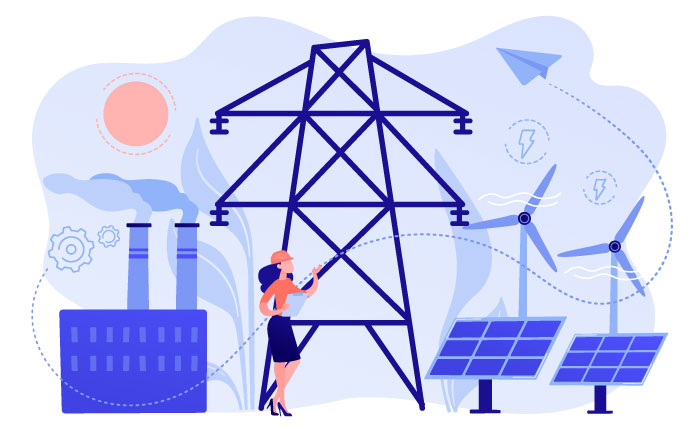India’s power generation sector stands at hubs, poised for significant transformation in the coming years. As the nation grapples with the challenges of meeting its growing energy demand, power generation companies find themselves at the forefront of innovation and adaptation. A confluence of factors, including technological advancements, policy initiatives, environmental concerns, and the evolving energy landscape, shape the future of these companies in India.
Renewable Energy Revolution
One of the most notable shifts in the power generation sector is the increasing focus on renewable energy sources. India has set ambitious targets for renewable energy capacity to achieve 175 gigawatts (GW) by 2022, with a further target of 450 GW by 2030. Power generation companies are embracing solar, wind, and hydropower to diversify their portfolios and reduce dependence on traditional fossil fuels.
Solar power, in particular, is emerging as a game-changer, with falling costs and technological advancements making it increasingly competitive. The government’s efforts to promote solar energy through incentives, subsidies, and policy support have created a conducive environment for power generation companies to invest in large-scale solar projects.
Grid Modernization and Energy Storage
India’s future of power generation is tied to the modernization of the electricity grid. Smart grids with advanced technologies enable better integration of renewable energy sources, enhance grid stability, and improve overall efficiency. Power generation companies are expected to invest in upgrading and expanding the grid infrastructure to accommodate the variable nature of renewable energy.
Energy storage technologies play a pivotal role in addressing the intermittency of renewable sources. Advancements in battery technologies and reduced costs open new possibilities for storing excess energy and ensuring a reliable power supply. Power generation companies strategically integrating energy storage solutions into their operations can enhance grid reliability and capture new market opportunities.
Policy Initiatives and Regulatory Landscape
Government policies and regulatory frameworks play a crucial role in shaping the future of power generation companies in India. The emphasis on renewable energy, environmental sustainability, and energy efficiency is reflected in various policy initiatives. Companies that align their strategies with these policies and actively participate in government-led schemes benefit from incentives and market support.
However, regulatory uncertainties and policy changes pose challenges for power generation companies. Adapting to evolving regulations and ensuring compliance will be essential for maintaining a competitive edge in the dynamic energy market.
Decentralization and Distributed Energy Resources
The future of power generation in India is witnessing a shift towards decentralization and the adoption of distributed energy resources (DERs). Decentralized power generation, often involving small-scale solar installations and microgrids, allows for greater resilience, reduced transmission losses, and increased energy access in remote areas.
Power generation companies exploring opportunities in DERs can tap into the growing market for rooftop solar, community-based energy projects, and off-grid solutions. Leveraging digital technologies for monitoring and managing distributed energy resources will ensure efficient operations in this evolving landscape.
Environmental Sustainability and Corporate Social Responsibility
As environmental concerns take centre stage globally, power generation companies in India are under increasing pressure to adopt sustainable practices. Investors, consumers, and regulatory bodies are demanding a commitment to reducing carbon emissions, minimizing environmental impact, and embracing socially responsible practices.
Companies that proactively invest in cleaner technologies, prioritize environmental sustainability, and engage in corporate social responsibility initiatives will likely build a positive reputation and enhance their long-term viability.
Conclusion
A dynamic interplay of technological innovation, policy dynamics, and market forces shapes India’s future of power generation companies. Embracing renewable energy, modernizing grid infrastructure, navigating regulatory challenges, and adopting sustainable practices will be crucial for companies seeking to thrive in this evolving landscape. As India marches towards a more sustainable and resilient energy future, power generation companies have the opportunity to be key drivers of positive change in the nation’s quest for reliable, affordable, and clean energy.





